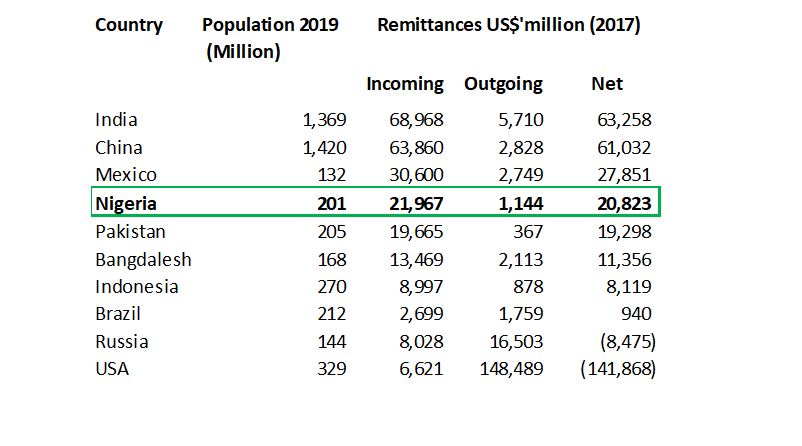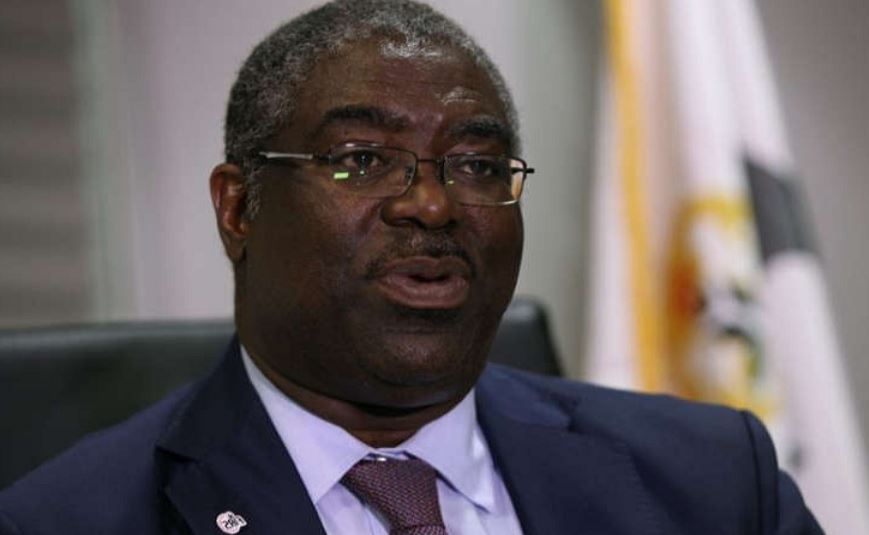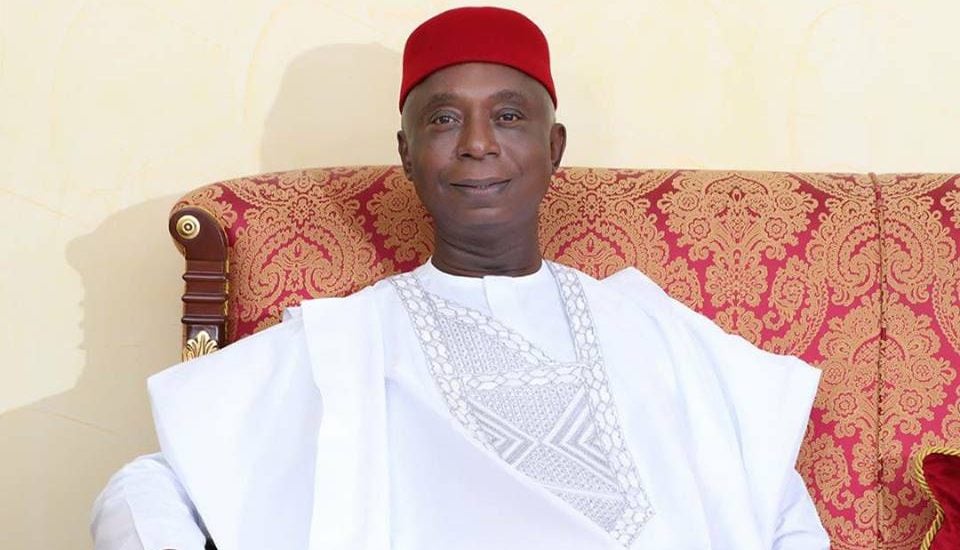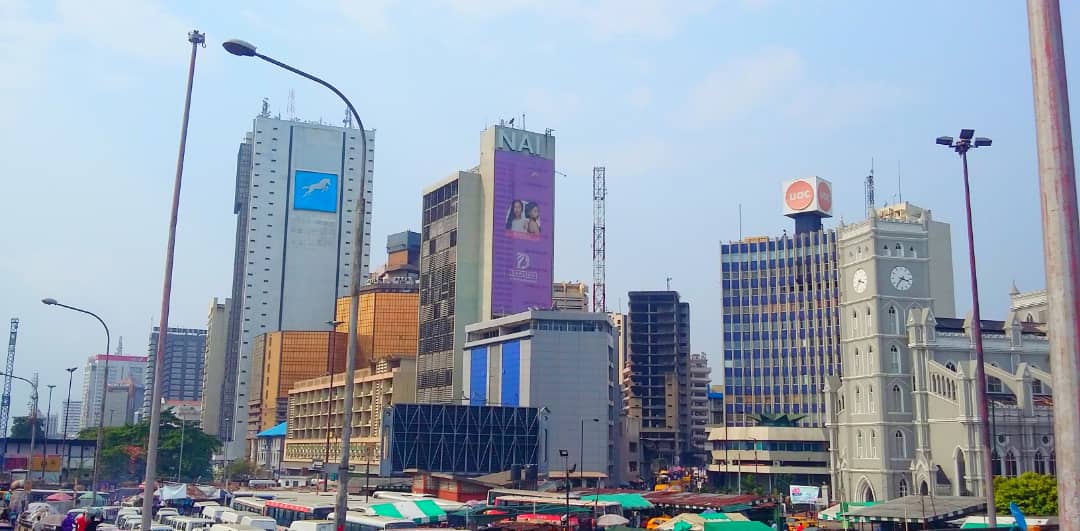BY DAYO OROLU
The recent revelation by Mr Ike Chioke, the Group CEO of Afrinvest Ltd, on the high-level remittances from Nigerians in the Diaspora to the Country as compared with actual export proceeds from Oil and Gas operations has brought to the fore the potential of Nigeria becoming a human capital nation rather than oil and gas. Mr Chioke asserted in his presentation that Nigeria earned $25bn in 2018 from Diaspora remittances compared with $18bn from gross crude oil and gas sales. It is an unassailable fact, quite frankly!
The statistics has generated interesting debates just at a time the nation is witnessing high emigration of skilled Nigerians to Europe and North America. Medical Doctors, Accountants, Engineers and best of Nigeria’s labour force are moving out of the Country in droves in search of greener pasture. It is therefore a relief of sort when the social media was washed with the revelation regarding the diaspora remittances. Maybe it’s not an entirely bad situation if the emigration leads to significant foreign exchange proceeds into the country in return.
HOW DOES NIGERIA COMPARE WITH THE HUMAN CAPITAL EXPORT NATIONS?
Advertisement
Nigeria is currently the 7th most populous country in the World. With an estimated 201 million people next to Pakistan – 205 million and ahead of Bangdalesh -168 million; Nigeria sits comfortably in the comity of top 10 most populous nations competing for abundant yet scarce resources globally. According to Pew Research Centre, immigrants sent a total of $625 billion to individuals in their home countries in year 2017. The top 10 most populated countries received $245 billion of this sum, approximately 40%. Nigeria ranks 4th on the list with a net inflow of US$21 billion ahead of Pakistan – US$19 billion and next to Mexico – US$28 billion.

Sources: Population Total Population by Country 2019
Advertisement
Remittances: Remittance flows worldwide in 2017
The United States of America which recorded a net outflow of $141 billion accounted for $6.2 billion of Nigeria’s inflow. Other significant inflows to Nigeria came from UK – $4.1 billion, Cameroon – $2.5 billion and Italy – $1 billion. Cameroon is a big surprise on the list and will make an interesting topic for further research.
FIERCE COMPETITION TO NIGERIA’S POTENTIAL
Nigeria’s dream of becoming a human capital export nation is threatened by the records of other highly populated nations of China, India, Mexico, Pakistan, Bangdalesh, and Indonesia. Of the top 3 in the list earlier shown, Mexico is the only nation with fewer people than Nigeria, but has strong fundamentals making it a strong competitor that Nigeria must be aware of. Among the top 10 populated nations, Nigeria ranked 8th on GDP, 7th on per Capita Income, 9th on the Ease of Doing Business and 10th on Human Development indices.
Advertisement

Sources:
GDP: GDP by Country 2019
EoDB: Rankings & Ease of Doing Business Score
Advertisement
HDI: Human Development Reports
BUILDING A COMPARATIVE ADVANTAGE FOR HUMAN CAPITAL EXPORT
Advertisement
It is interesting that China with a population that is seven times that of Nigeria has far better ranking on Ease of Doing business and Human Development Index. China also received inflows that is three times more than what Nigeria received in the period under review. This implies that while Chinese nationals in the diaspora are contributing significantly to their home Country’s earnings, the citizens and residents back at home equally enjoy considerable level of comfort and quality of life. It is therefore important to realize that Nigeria does not enjoy any unique position or status with respect to diaspora remittances. For every available headcount in Nigeria, China, India, USA, Indonesia and even Brazil may have more qualified produce on offer.
For Nigeria to stake any claim in the business of human capital, the fundamentals at home must be urgently addressed. As a first step, there must be a strategic policy plan towards achieving this objective. A research by Paul Elekwa et al on Human Capital Development and Non-Oil Export Growth in Nigeria (published in Global Journal of Applied, Management and Social Sciences (GOJAMSS); Vol 12 September 2016 p.109-114), revealed a statistically significant but inverse relationship between human capital development and growth of non-oil export in Nigeria. The research listed plausible reasons for the outcome to include ineffectiveness of education, lack of training and requisite experience and general absence of skills intensive export. In simple terms, the quality of human capital produce from Nigeria is poor!
Advertisement
The decision by many Nigerians to emigrate in recent years did not come easy. Often, many opted to leave out of frustrations by the dearth of basic social infrastructure, economic hardship and insecurity that has bedeviled the nation for many years. The condition in which many Nigerians approached other Countries for working permit or immigrant visa are not mostly pleasant. It is a completely different story for nationals of developed nations when they knock on our doors. What kind of jobs are Nigerians doing over there that is generating these huge remittances? Can they get better deals if they are less desperate and better skilled? Why are Nigerians asked to take English Language competency test despite English being the official language of communication and teaching? It shows the level of value Nigerian human capital produce is accorded in the international market.
Nigeria must make great efforts to elevate its human development index from the current 157th position (the worst being Niger Republic occupying 189th position). Provision of basic social infrastructure – reliable electricity, quality education, affordable and adequate healthcare, efficient transport system, internet facilities, and effective system of rule of law, must be of national priority. Insecurity and high poverty rates must be tackled through concrete job creation plans, investment in technical vocational training and creation of social safety net for the less privileged. Fixing power will be a huge first step! China presents a good model for Nigeria. Despite its humongous population, the country has succeeded in building a strong local economy with highly skilled human capital that’s now being exported globally. The Chinese government has a deliberate educational policy that helps citizens have the best of global education and exposure and an enabling home environment to return to. They also have strong business support framework for cross-border investments by their nationals.
Advertisement
Peradventure the Chinese model is for the long term,adequate steps must be taken from now if Nigeria would realize and maximize the full potentials of its human capital as well as provide an economically stable home for citizens and residents.
Orolu, a chartered accountant and business development expert, can be reached via [email protected]
Views expressed by contributors are strictly personal and not of TheCable.
Add a comment






